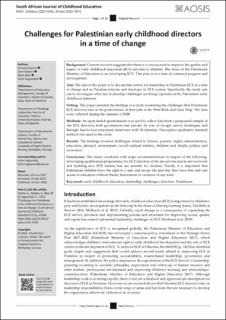| dc.contributor.author | Sayma, Somaya | |
| dc.contributor.author | Adwan, Sami | |
| dc.contributor.author | Bøe, Marit | |
| dc.contributor.author | Hognestad, Karin | |
| dc.date.accessioned | 2022-11-09T09:19:58Z | |
| dc.date.available | 2022-11-09T09:19:58Z | |
| dc.date.created | 2022-10-31T12:58:18Z | |
| dc.date.issued | 2022 | |
| dc.identifier.citation | Sayma, S., Adwan, S., Boe, M., & Hognestad, K. (2022). Challenges for Palestinian early childhood directors in a time of change. South African Journal of Childhood Education, 12(1), Artikkel a1039. | en_US |
| dc.identifier.issn | 2223-7674 | |
| dc.identifier.issn | 2223-7682 | |
| dc.identifier.uri | https://hdl.handle.net/11250/3030852 | |
| dc.description.abstract | Background: Current research suggests that there is a serious need to improve the quality and equity of early childhood education (ECE) services to children. The focus of the Palestinian Ministry of Education is on developing ECE. This plan is in a state of continual progress and development.
Aim: The aim of this paper is to discuss the context for leadership in Palestinian ECE in a time of change and as Palestine reforms and develops its ECE system. Specifically, the study sets out to investigate what key leadership challenges are being experienced by Palestinian early childhood directors.
Setting: This paper presents the findings of a study examining the challenges that Palestinian ECE directors face in the performance of their jobs in the West Bank and Gaza Strip. The data were collected during the summer of 2020.
Methods: An open-ended questionnaire was used to collect data from a purposeful sample of 166 ECE directors, both government and private, by way of Google survey techniques and through face-to-face structured interviews with 10 directors. Descriptive qualitative research method was used in the study.
Results: The findings revealed challenges related to finance, parents, higher administration, educators, physical environment, social/cultural matters, children and, finally, politics and economics.
Conclusion: This study concludes with major recommendations in respect of the following: developing qualification programmes for ECE directors at the pre-service and in-service levels and building new ECE centres that are suitable for children. Finally, it is important that Palestinian children have the right to a safe and secure life and that they have free and safe access to education without threat, harassment or violation of any kind. | en_US |
| dc.language.iso | eng | en_US |
| dc.rights | Navngivelse 4.0 Internasjonal | * |
| dc.rights.uri | http://creativecommons.org/licenses/by/4.0/deed.no | * |
| dc.title | Challenges for Palestinian early childhood directors in a time of change | en_US |
| dc.type | Peer reviewed | en_US |
| dc.type | Journal article | en_US |
| dc.description.version | publishedVersion | en_US |
| dc.rights.holder | © 2022, The Authors. | en_US |
| dc.source.pagenumber | 10 | en_US |
| dc.source.volume | 12 | en_US |
| dc.source.journal | South African Journal of Childhood Education | en_US |
| dc.source.issue | 1 | en_US |
| dc.identifier.doi | https://doi.org/10.4102/sajce.v12i1.1039 | |
| dc.identifier.cristin | 2066791 | |
| dc.source.articlenumber | a1039 | en_US |
| cristin.ispublished | true | |
| cristin.fulltext | original | |
| cristin.qualitycode | 1 | |

